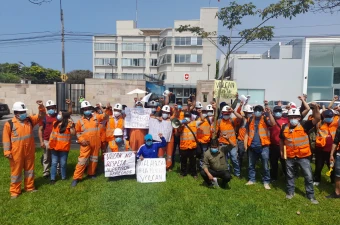Ruling T-029 of 2025 establishes a fundamental precedent by guaranteeing due process and the effective participation of communities and unions affected by the closure of large-scale mining operations.
This ruling responds to a legal action led by communities and dismissed workers in the departments of Cesar and Magdalena, in Colombia's northern mining region. For more than four years they have demanded a transparent social dialogue between the actors involved. They are calling for the implementation of measures to mitigate the impact of mining closures
Why this matters for European businesses and investors
The Colombian Constitutional Court’s Ruling T-029 of 2025 has set a crucial precedent in ensuring fair mine closure processes, highlighting the power imbalance between multinational mining corporations and local communities.
This decision follows years of advocacy by dismissed coal mine workers and affected communities in Cesar and Magdalena, regions in the north of Colombia that that have been entirely economically dependent on mining for decades.
Trade unions and community organisations have struggled against corporate dominance in mine closure negotiations for more than four years, demanding a transparent social dialogue among the involved stakeholders and the implementation of measures to mitigate the impact of mine closures.
The case underscores the urgent need for European businesses, investors, and policymakers to uphold human rights due diligence (HRDD) in global supply chains and enforce responsible corporate practices within their value chains.
Corporate influence delaying justice
The ruling mandates the creation of a “Gran mesa de concertación”, a large roundtable for consultation.
The purpose of this roundtable is to ensure citizen participation, so that workers and local communities have a meaningful role in defining the measures that the multinational Glencore-Prodeco must adopt within its mine closure plan. This plan is currently under review by Colombia's National Authority of Environmental Licenses (ANLA).
The Court has determined that previous corporate-led consultations were inadequate, reinforcing concerns that multinational corporations often dictate the pace and terms of transition, sidelining workers and local populations.
Additionally, the Court found that the Seventh Administrative Court of Valledupar violated the right to a due process. This Court accepted a single, insufficient consultation meeting in 2022 as compliance with community participation requirements.
This case highlights the need for stronger oversight from European governments and financial institutions to ensure that corporate-led mine closures align with international labor and environmental standards.
Implications of the Ruling
The Constitutional Court's decision orders the reopening of the contempt case against the legal representative of Grupo Empresarial Prodeco S.A. It mandates a review of compliance with the ruling and the agreements established in previous meeting records.
For the communities and workers this is a significant step forward in defending their rights. It reinforces their demand for a fair and responsible mine closure where the voices of workers are at the center of the process.
The Role of European Stakeholders in a Just Transition
For a Just Transition to be truly fair, European businesses, investors, and policymakers must take action to uphold responsible corporate practices.
This ruling reinforces the following priorities:
- To Glencore-Prodeco: commit to a constructive social dialogue and avoid further delaying implementation of compensation and restoration measures.
- Corporate Due Diligence & Compliance: European mining companies, financiers, and supply chain actors must align with the EU Corporate Sustainability Due Diligence Directive (CSDDD) to prevent human rights violations in mine closures.
- State and Institutional Oversight: Governments, including the European Commission and national labor ministries, should enforce stricter due diligence requirements and monitor compliance with international labor laws.
- Investor and Financial Sector Responsibility: Financial institutions investing in extractive industries must demand greater transparency, social dialogue, and responsible disengagement strategies from multinational mining firms.
- Strengthening Worker and Community Participation: European labor unions and industry groups must advocate for binding agreements that ensure affected communities and trade unions have genuine influence in decision-making.
Companies cannot disengage without accountability.
Ensuring responsible mine closures
At CNV Internationaal, we call on European corporations, policymakers, and financial institutions to take this ruling as a wake-up call. The power imbalance between multinationals and local communities is a major barrier to a just transition. Companies cannot disengage without accountability.
The Workers Collective for a Just Energy Transition, supported by CNV Internationaal, continues to push for a multi-stakeholder pact that ensures ethical, transparent, and responsible mine closure practices.

Publication date 12 02 2025


